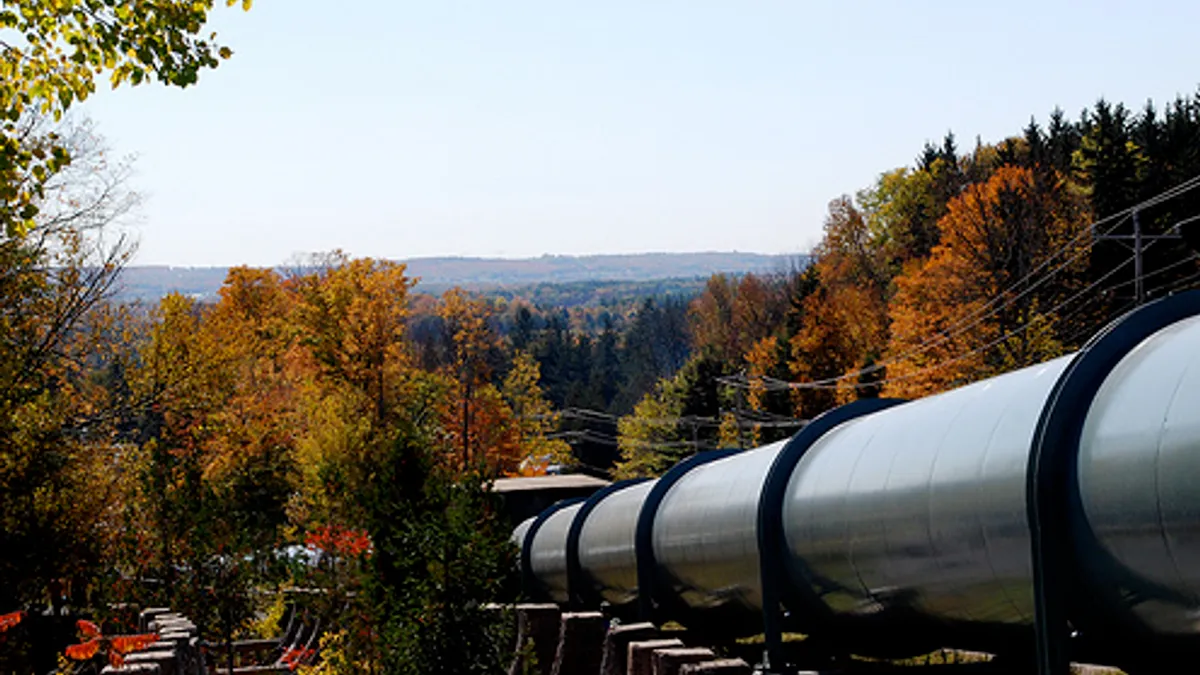Dive Brief:
- Federal regulators authorized construction of the Atlantic Coast Pipeline in North Carolina this week, concluding no additional review was required by the U.S. Fish and Wildlife Service (FWS).
- In May, the Fourth Circuit Court of Appeals blocked project sponsor Dominion Energy from constructing the line in certain areas where the court concluded regulators did not set proper environmental limits.
- Opponents of the project say the piecemeal approach to construction segments is at odds with the Endangered Species Act, and an attorney for Southern Environmental Law Center (SELC) said a challenge was filed with the federal court to stop construction, according to the Virginia Mercury.
Dive Insight:
Dominion and other supporters of the $6 billion Atlantic Coast Pipeline scored a big victory this week, but opponents are hoping the appeals court will intervene. SELC argues that allowing the company to move ahead with construction on one portion of the line — when not all approvals are in place — is improper.
“It’s an all or nothing sort of deal," SELC attorney Patrick Hunter told the Virginia Mercury.
FERC, however, has authorized construction to begin, allowing Dominion "full use of and improvements to access roads." The commission also said it reviewed FWS comments before making its decision, "and have confirmed that no additional consultation under the Endangered Species Act is required for the areas subject to this notice to proceed."
Earlier this month, the commission authorized the construction of two other pipeline projects: the Eastern Panhandle Expansion Project and the Texas and Louisiana Market Expansion Project, as well as an upgrade to the North Seattle pipeline in Washington.
Duke Energy and Southern Co. are also involved in the project's development. The pipeline will transport gas through parts of West Virginia, Virginia and North Carolina.
SELC has argued on behalf of Defenders of Wildlife, Virginia Wilderness Committee and Sierra Club that the project should be halted entirely. Opponents of new gas plants say many of these pipelines and projects are not only environmentally harmful, but also unnecessary in the first place, as they can increasingly be replaced with renewables and storage.
FERC in April launched a notice of inquiry to review its process of evaluating interstate natural gas pipelines, including how the commission evaluates the need for new pipelines, its use of eminent domain, environmental impacts and the permitting process.
More recently, the commission seems split on how to consider both the need for pipeline capacity and its carbon impacts. Last month, regulators voted 3-2 to deny a rehearing on the Mountain Valley Pipeline, allowing construction to continue on the 300-mile gas line running from West Virginia into Virginia.
More than a dozen environmental groups have asked FERC to reconsider the 2017 decision that initially approved the pipeline, arguing regulators should have given more weight to ecological impacts and not base their assessments of pipeline need solely on contracts signed with gas consumers.
FERC Commissioner Robert Powelson, a Republican, recently announced plans to leave the commission next month. That could leave Republicans and Democrats in 2-2 splits on projects until President Trump nominates a replacement.
FERC Chairman Kevin McIntyre, however, has said he "doesn't anticipate a raft of 2-2 votes."















